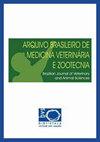Short-term outcomes of trochlear recession surgery combined with “Watermelon” autograft for treatment of canine medial patellar luxation: a case series
IF 0.5
4区 农林科学
Q4 VETERINARY SCIENCES
Arquivo Brasileiro De Medicina Veterinaria E Zootecnia
Pub Date : 2023-03-01
DOI:10.1590/1678-4162-12852
引用次数: 0
Abstract
ABSTRACT The aim of this study was to present a novel surgical method for correction of medial patellar luxation in small-breed dogs with trochlear dysplasia and marked hypoplasia of the medial femoral condyle. The “Watermelon” approach was applied together with trochlear wedge recession or trochlear block recession and consisted in increasing the height of the medial condyle with an osteochondral autograft resembling a watermelon slice, placed into an additional slot in the medial femoral condyle to prevent the postoperative reluxation of the patella. The study cohort included 19 dogs (25 joints) from small breeds (Pinscher, Pomeranian, and Chihuahua) with second-grade medial patellar luxation. Fourteen joints were submitted to wedge recession surgery combined with “Watermelon” grafting, and 11 joints: to block recession surgery with “Watermelon” grafting. The sulcus-deepening trochleoplasty combined with “Watermelon” grafting was clinically successful and with low percentage of minor postoperative complications. The mean duration of anesthesia was significantly longer for block recession combined with “Watermelon” (P<0.001), but the recovery period was shorter (P<0.05).滑车后退手术联合自体“西瓜”移植治疗犬内侧髌骨脱位的近期疗效:一系列病例
摘要本研究的目的是提出一种新的手术方法来矫正小品种犬滑车发育不良和股骨内侧髁明显发育不全的内侧髌骨脱位。“西瓜”入路与滑车楔状凹陷或滑车块凹陷一起应用,包括用类似西瓜片的自体骨软骨移植物增加内侧髁的高度,将其放入股骨内侧髁的额外槽中,以防止术后髌骨再脱位。该研究队列包括19只患有二级内侧髌骨脱位的小型犬(品舍犬、波美拉尼亚犬和吉娃娃犬)(25个关节)。14个关节接受楔形后退手术结合“西瓜”移植,11个关节接受“西瓜”植入阻断后退手术。脑沟加深滑车成形术结合“西瓜”移植术在临床上是成功的,术后小并发症的发生率较低。阻滞消退联合“西瓜”麻醉的平均麻醉持续时间明显延长(P<0.001),但恢复期较短(P<0.05)。
本文章由计算机程序翻译,如有差异,请以英文原文为准。
求助全文
约1分钟内获得全文
求助全文
来源期刊
CiteScore
0.80
自引率
25.00%
发文量
111
审稿时长
9-18 weeks
期刊介绍:
Publica artigos originais de pesquisa sobre temas de medicina veterinária, zootecnia, tecnologia e inspeção de produtos de origem animal e áreas afins relacionadas com a produção animal. Atualmente a revista mantém 628 permutas (419 internacionais e 209 nacionais), sendo um verdadeiro suporte para o recebimento de periódicos pela Biblioteca da Escola.
A partir de 1999, a Escola de Veterinária delegou à FEP MVZ Editora o encargo do gerenciamento e edição de todas suas publicações, inclusive do Arquivo, ficando somente com o apoio logístico (instalações, equipamentos, pessoal etc.). O apoio financeiro é exercido pelo CNPq/FINEP e pela própria FEP MVZ.

 求助内容:
求助内容: 应助结果提醒方式:
应助结果提醒方式:


